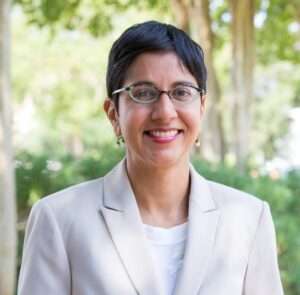As many VC blog readers know, several state legislatures have passed or are considering passing legislation to restrict or abolish tenure for professors at public universities. Among them is Texas, which recently weakened tenure protections and is seeking to pass further restrictions on what professors can teach.
To give VC blog readers a more personal perspective on the impact of these policies, I interviewed patent law scholar Professor Sapna Kumar on her decision to leave the Texas public university system. Until recently, Professor Kumar held the John Mixon Chair in Law at the University of Houston Law Center. She is now the Henry J. Fletcher Professor of Law at the University of Minnesota Law School.
What first drew you to Houston and to teaching at a public university there?
I grew up in the Houston area, and I have both family and close friends there. So I knew that Houston had a lot to offer in terms of culture, restaurants, and an affordable cost of living.
I also really liked the idea of working for a public university. I am not religious and was therefore reluctant to join a religiously-affiliated private university. I also view public law schools as being more financially stable compared to most private ones, given that state funding can allow a public school to weather downturns in the economy. Working for the University of Houston seemed like a smart choice.
What was your time at the University of Houston Law Center like?
UHLC was a great choice for me. They have a large intellectual property program with several professors in my field who provided mentoring. I had a lot of financial support to attend conferences and to conduct research abroad. I also appreciated the politically diverse faculty, with professors who have a range of viewpoints.
After Lt. Gov. Dan Patrick vowed to abolish tenure in Texas in 2022, the faculty started getting nervous about what the impact would be. Many of us were concerned that the state would interfere with the content of our classes and would limit what we could research and publish. I became aware of faculty both at UHLC and at other Texas public universities who were looking for jobs out of state. That's when I started considering leaving Texas.
Were there other political developments that influenced your university's ability to recruit or retain people?
Yes, when the U.S. Supreme Court issued the Dobbs decision, striking down Roe v. Wade, a number of restrictive abortion laws took effect in Texas. This immediately impacted our ability to hire younger professors. Friends at other Texas universities reported similar difficulties as well. Even though jobs were well compensated and tenure-track positions are hard to come by, positions in Texas law schools went unfilled.
What was your reaction when the law weakening tenure at Texas public institutions was passed?
The administrators for the University of Houston system, along with those at other Texas state universities, downplayed the impact that this would have on faculty, claiming that it didn't change anything. The reality is that the new law creates a number of vague grounds for firing professors, such as for "unprofessionalism."
The fact that it's the Board of Regents that gets to pass related policies–all of whose members are appointed by Governor Abbott–shows how much control Texas now has over its professors. The fear is that if a state university professor vocally opposes the state government, that the state will pressure the university to fire the professor.
Would you have actively been trying to leave but for the political climate in Texas and the changes to its tenure system in public universities?
No, I wouldn't have. Houston is an amazingly diverse city, with more than 145 languages spoken in the greater metropolitan area. I miss my friends and family, the warm weather that allowed for year-round running, as well as eating at all the fabulous restaurants.
So leaving Texas is a real loss for you?
Absolutely. While I love my new institution and am happy to be closer to my spouse's extended family, I really didn't think I was ever going to leave Texas unless professional reasons made it imperative.
Some people probably think that hardcore progressives are the only ones who should be really concerned about whether they could lose their academic jobs over their viewpoints in a state like Texas. Does that describe you?
No, definitely not. People of all political stripes are concerned about the state telling professors about what they can and cannot teach or research. This includes political moderates, such as myself.
What attracted you to take a position at the University of Minnesota Law School?
There is a much stronger commitment to academic freedom in Minnesota than in Texas. There are no state laws restricting what professors can teach, nor can the university fire professors based on their viewpoints or the topics that they choose to research. And I am happy to be a part of the amazing community of scholars and students at UMN.
If Texas changed its laws in the future and restored things to the way you found them when you arrived in 2009, would you consider moving back and teaching at a Texas public university again?
I would. I do hope that Texas dismantles these laws, though I fear that this won't happen in my lifetime.
Many thanks!
The post Interview with Prof. Sapna Kumar on Her Decision to Seek Employment Outside of Texas appeared first on Reason.com.







